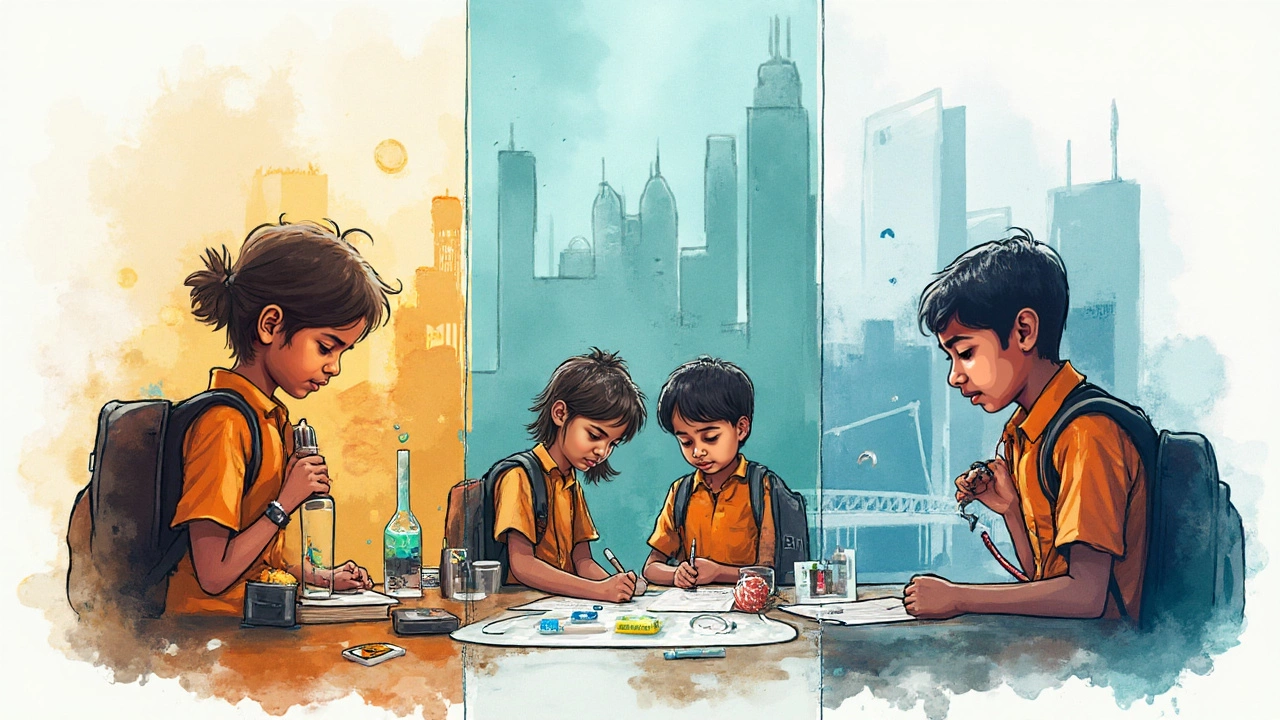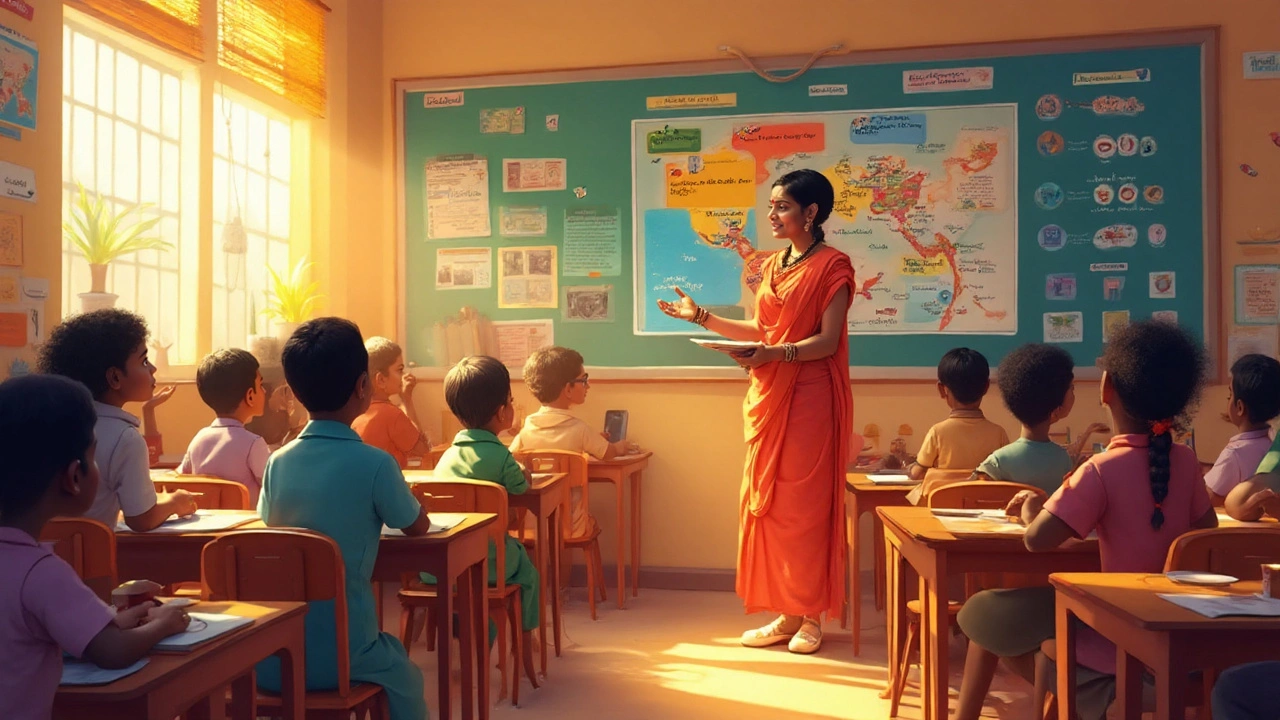Ever wondered which educational board claims the title of “most popular in the world?” The answer is a bit trickier than you’d think and comes with loads of debate, opinions, and even a little bit of bragging depending on who you ask. Education isn’t a one-size-fits-all deal. The board you pick influences everything from the kind of classrooms you sit in to the exams you sweat over, even what colleges recognize your qualification. Whether you’re a nervous parent, a curious student, or just someone fascinated by the way different countries teach their kids, there’s more here than acronyms and exam timetables to unpack. The real surprise? The winner changes depending on where you’re standing—and what you’re measuring.
The Heavyweights: Meet the Major Educational Boards
If you ask ten people which board is the most popular, you’ll probably get ten different opinions. But on the grand stage, a few names reliably pop up: CBSE, ICSE, IB, IGCSE, Cambridge, and of course, massive national boards like the American K-12 system and China’s National College Entrance Examination (Gaokao) board. The Central Board of Secondary Education (CBSE) from India is famous across not just India but is also gaining ground in South Asia, the Gulf, and even Africa. There are over 27,000 CBSE schools worldwide as of 2025. The Indian Certificate of Secondary Education (ICSE) is known for its detailed curriculum and is a darling in India’s urban centers but doesn’t have the same global reach.
The International Baccalaureate (IB) lives up to its name. As of this year, it’s offered in over 5,600 schools in more than 160 countries. The British-originated Cambridge Assessment International Education (Cambridge International or IGCSE) is present in more than 10,000 schools in 160+ countries, which is not small beans either. Then there’s America’s K-12 system, which doesn’t go by a single board but is a sum of state boards setting their own curriculums, impacting nearly 50 million students. China’s Gaokao, on the other hand, has no international competitors in sheer size—over 12 million students attempt this exam each year, making it a national obsession.
So, what does “popular” really mean? If you’re talking about pure numbers, China’s system takes the win by a mile. But if you’re more interested in international presence, the IB and Cambridge are big players. If you want to see where most government jobs, college admissions, and international pathways meet, CBSE gets some serious points. The trick is knowing what “popular” means for you: most users, most recognized, or most respected?
| Board | Countries Served | No. of Schools | Students |
|---|---|---|---|
| CBSE | 28+ | 27,000+ | 30 million+ |
| ICSE | 1 (India Mainly) | 2,500+ | 2.5 million+ |
| IB | 160+ | 5,600+ | 2 million+ |
| Cambridge IGCSE | 160+ | 10,000+ | 2.6 million+ |
| US State Boards | 1 (US) | 98,000+ | 50 million+ |
| China (Gaokao) | 1 (China) | 80,000+ | 12 million/year |
Examining CBSE: India’s Dominant Force
The Central Board of Secondary Education isn’t just a household name in India; it’s spread its wings far and wide. One big reason parents love CBSE: it’s recognized by almost all Indian colleges and competitive exams, including top ones like IIT-JEE and NEET. You’re not stuck learning stuff you’ll never use again—there’s a good balance of theory and practical applications. Plus, the language is accessible and the board regularly updates its textbooks to stick with the times.
CBSE’s real strength comes from its straightforward, exam-focused approach. It’s less about mugging up endless textbooks, more about understanding concepts. Many parents pick CBSE for the easy transitions it offers; you can move from one city to another and plug straight into the same curriculum. Internationally, CBSE is running schools from Dubai to Singapore, and even in countries like Nigeria and Nepal. It adapts its curriculum overseas for local needs, so if you move abroad, your kid won’t be lost.
Yet, there are downsides. Some students say it’s too ‘by the book’ and lacks the creative punch you find in boards like IB. There can also be a gap when switching to university abroad, especially when schools use teaching methods very different from what CBSE offers. Still, if you want a safe bet for jobs, college, and government services in India (and increasingly outside), CBSE is your guy. If you’re chasing stability and recognition, it checks almost every box imaginable.

The International All-Rounders: IB and Cambridge
You can spot IB and Cambridge International schools in almost every big city on the planet. The International Baccalaureate, founded back in 1968 in Switzerland, was designed for families on the move. Think of diplomats, expats, and globally-mobile professionals. The IB’s magic? Its programs focus on inquiry-based learning, global citizenship, and critical thinking. Instead of just memorizing facts, you get grilled on how to apply them. This makes IB one of the best foundations if your aim is a university abroad—a huge percentage of Ivy League and Oxford admissions include IB grads.
The IB Diploma Program (for grades 11–12) is especially valued. It makes students juggle six subjects, a detailed research essay, and community service. Sounds tough? It is. But if your goal is Harvard, Stanford, or a top school in the UK, IB is a door opener, with many universities even granting course credits for high grades. But be warned: it’s time-intensive and can be stressful for those who just want to cruise.
Cambridge International (or IGCSE) has a slightly different flavor. The IGCSE courses, created by the University of Cambridge, are loved for their mix of academic depth and flexibility. Schools can choose subjects to suit their students: sciences, humanities, languages, even the arts. Cambridge is also famous for its clear, structured assessments and focus on reasoning skills. If you want to keep the door open on both Indian and international colleges, this is a solid choice. However, students sometimes complain that shifting from IGCSE to Indian universities isn’t dead simple—there can be differences in credits and subject combinations. Still, in terms of sheer geography and adaptability, Cambridge’s reach is stunning.
The Regional Giants: American K-12 and China’s Gaokao
The American K-12 system is massive—but it isn’t a single board. Each of the 50 states sets its curriculum, so there’s no “one size fits all.” There are standards in math, science, English, and history, but also space for electives like media, robotics, and drama. Standardized tests like the SAT and ACT act as a great leveler. The US system is flexible; you can tailor your high school years to fit the kind of college or job you want. Besides, American high schools are the birthplace of Advanced Placement (AP) and Honors courses, both big brownie points for college admissions. That flexibility is both a blessing and a curse—some districts offer world-class teaching, others struggle with resources.
If you want “biggest by volume,” China’s Gaokao is unbeatable. This single life-changing exam happens once each year and determines the college fate of nearly every high schooler in China. Families spend years preparing for those test days—schools turn into exam boot camps, and the whole country almost comes to a standstill. In terms of pure reach, Gaokao dwarfs every other board. The catch? It’s uniquely tuned to Chinese universities. The curriculum and the exam style don’t travel well—students often need bridge programs if they suddenly want to study abroad. But within China, Gaokao is the only game in town, and it shapes the nation’s approach to learning and success.
Here’s a quick look comparing the key features:
| Board | Global Recognition | Curriculum Style | Assessment |
|---|---|---|---|
| CBSE | High (India/Asia) | Theory/Practical mix | Structured exams, yearly |
| ICSE | Moderate (Urban India) | Detailed, English focus | Diverse, subject-wise |
| IB | High (Global) | Inquiry-based, holistic | Internal & external, essays |
| IGCSE | High (Global) | Customizable, depth | Subject-wise, flexible |
| US State Boards | High (US, recognized globally) | Flexible, broad | Continuous, GPA + Tests |
| Gaokao | Low global, high in China | Rigorous, traditional | One major annual exam |

How Do You Choose? Tips for Picking the Right Board
Navigating the world of boards isn’t easy. Before locking yourself or your kids into years of study, a few questions can help. First, ask where you plan to stay. If transfers between cities or countries are likely, a globally recognized board like IB or Cambridge keeps life simple. But if you’re eyes are set on Indian competitive exams or government jobs, CBSE is the clear winner. Planning to move to the US down the line? Some international schools offer an “American curriculum” option, perfect for those who want that flavor early. For China, Gaokao is basically a must if university is the goal.
Passion matters too. IB and Cambridge are intense—you’ll need to dive into essays, projects, and research. They’re perfect for kids who love exploring and thrive on variety. CBSE and ICSE, meanwhile, still deliver a strong academic base without the same level of project work. Budget is a real issue, too: international boards can get pricey, especially in cities where they’re ‘premium’ options. Watch out for transfer issues: not every board’s grade 10 or 12 certificate is accepted by every university. Check the fine print before you make a jump between boards or countries. And for high-flyers, exam structure is worth considering—some boards are exam-heavy, others lean on ongoing assessments.
If you’re overwhelmed, talk to parents whose kids have already been through different boards. Nothing beats first-hand reviews about how tough homework gets, how teachers handle doubts, and what daily life in the classroom feels like. Remember, you’re not picking just a curriculum—you’re signing up for years of a particular approach to learning. Get it right, and the journey feels smooth. Get it wrong, and every day feels like a slog.
One last tip: check what the “preferred board” is at your dream colleges, or which qualifications open up the jobs you want. Link your school board choice to your long-term plan and save yourself a lot of headaches later.
